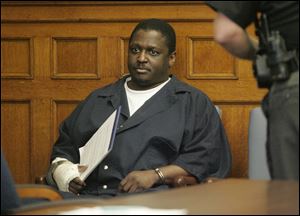
Death-row inmate asks for reversal
Top court hears arson fatalities case
3/20/2012
Wayne Powell awaits sentencing in Common Pleas Court Sept. 13, 2007. Convicted of aggravated murder and aggravated arson, he received four death sentences for a fire that killed four members of a family at 814 St. John Ave. in 2006.
COLUMBUS — As the victims' family watched, attorneys for a former Toledo man convicted of setting a 2006 house fire that killed four people urged the Ohio Supreme Court Tuesday to keep him from the lethal- injection gurney.
Wayne Powell, 46, faces four death sentences as well as a 10-year sentence for aggravated arson. Two of the victims were young children.
Shortly after Tuesday's Supreme Court arguments began, relatives of the victims walked in and sat near the front of the courtroom.
"It was important to be here because that is my family," Felicia McCollum, the sister and daughter of two of the victims, said after the arguments ended.
"That was our life," she said. "That was our world. … That was our foundation. At the end of the day, we're here to the end until the book is closed and 'we'll see you guys if you want to come to his execution.' I don't care if it's in Africa, if there's a will and there's a way, we're going to get there. We're going to see it through until everything is completely done and over with, until he gets what he deserves."
The high court did not issue an immediate ruling.
Powell's Dayton attorney, Gary W. Crim, argued that the trial judge erred when he allowed the jury to see a videotape in which Powell's brother, Isaac, told police his brother admitted pouring gasoline onto the side of the house.
He also maintained that the prosecution should not have been allowed to point out to the jury during the mitigation phase of the trial that Powell didn't take the stand.
But Justice Evelyn Lundberg Stratton pointed to 90 cell phone calls Powell made to one of his victims, his 33-year-old estranged girlfriend, Mary Rose McCollum, the night before and during the early morning hours, abruptly stopping about the time of the fire.
"He testified that he didn't find out about the fire until he watched the news the next morning," Justice Stratton said.
She and other justices questioned whether the errors cited rise to the level of overturning four murder convictions and death sentences.
"If we apply a harmless error analysis in light of pretty overwhelming evidence otherwise, where would this have made the difference?" Justice Stratton asked.
The prosecution theorized that Powell poured gasoline into the house at 814 St. John Ave. through a crack in a door early in the morning of Nov. 11, 2006, before setting the fire that killed Ms. McCollum; her ailing mother, Rose Mary McCollum, 52; her 4-year-old adopted son, Jamal, and 2-year-old niece Sanaa' Thomas.
Police later found gasoline on Powell's clothes. He had previously threatened to set fire to the home and had once before poured gasoline on the house's front porch. He is incarcerated at the new Ohio death row at the Chillicothe Correctional Institution.
Mr. Crim argued that the prosecution improperly used a videotape of a police statement to challenge the testimony on the stand by its own witness, Powell's brother Isaac. Lucas County Assistant Prosecutor David Cooper told the high court that a transcript of Isaac Powell's prior testimony before a grand jury and the police video tape were used to "refresh" his memory about the prior gasoline statement.
"They did not refresh his recollection," Mr. Crim said. "They impeached him."
He added that the video was the last thing the jury saw before beginning deliberations and again during deliberations when they raised a question. When cross-examined by the defense, Isaac Powell claimed he made the statement about the gasoline because he felt pressured by Toledo police.
On a different issue, Mr. Cooper told the court the prosecution pointed out that Powell did not testify to defend himself to the jury during the sentencing phase of the trial to indicate he didn't demonstrate remorse.
"Where is the place for remorse when he claims to not have committed the act?" Justice Paul Pfeifer asked.
Contact Jim Provance at: jprovance@theblade.com or 614-221-0496.